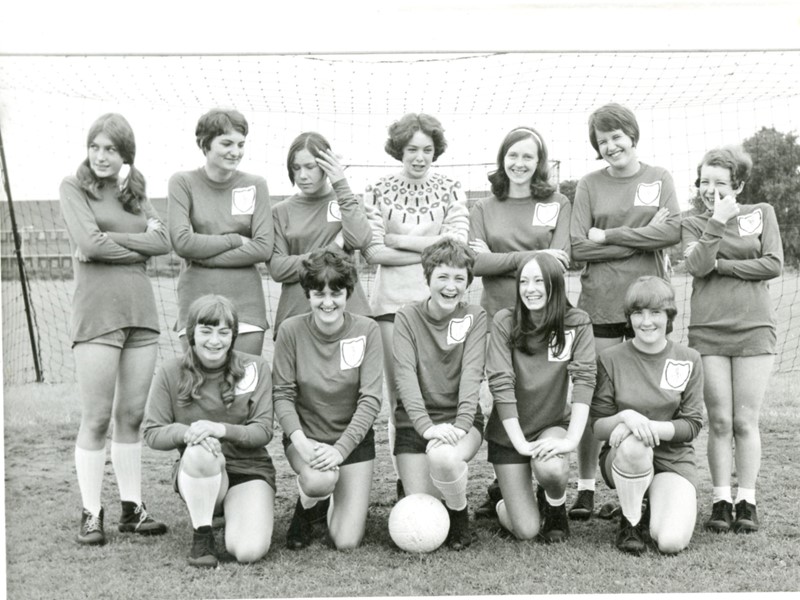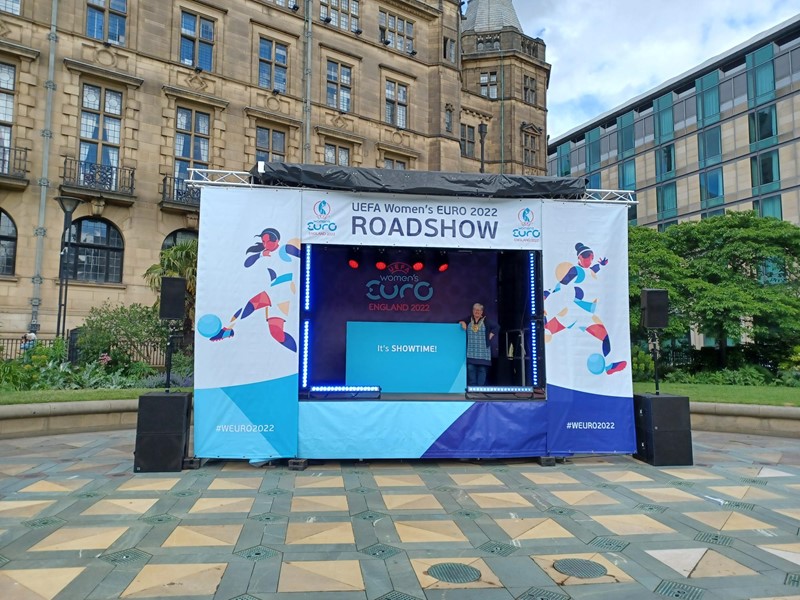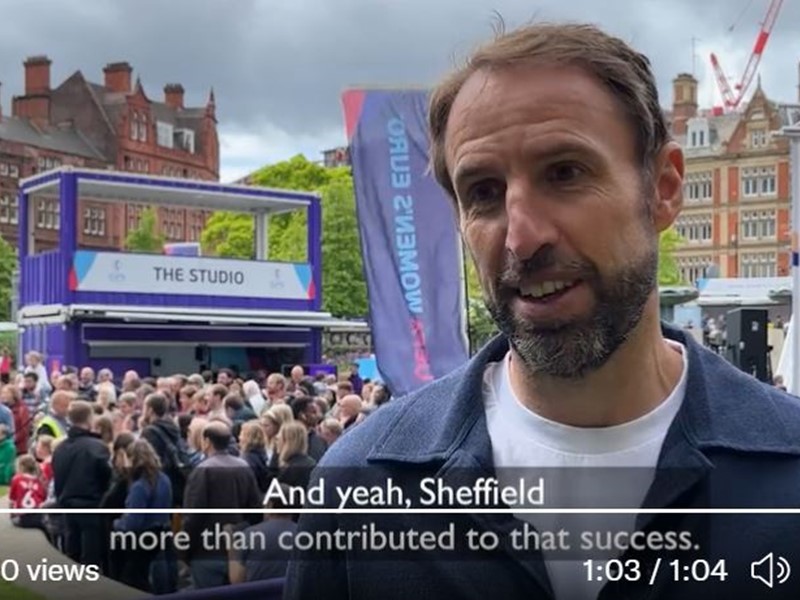The FA and UEFA have today released the UEFA Women’s EURO 2022 Pre-tournament Impact Report, confirming it’s on track to be the biggest women’s European sport event in history, putting millions in to host cities' economy and leaving a lasting legacy that will make a difference to communities for generations.
History of women’s football to be revealed and celebrated by UEFA Women’s EURO 2022 Heritage Programme

Sheffield as one of the nine UEFA Women’s EURO 2022 host cities is taking part in a National Lottery funded project to uncover the hidden history of women’s football in a summer of celebration of the game, its players and communities.
- £500,000 from National Lottery to share 141 years of women’s football
- Sheffield City Council joins UEFA Women’s EURO 2022 summer of celebration in partnership with The FA
- Stories of pioneering women and girls will be recorded for the first time
- Across the city towering columns will showcase women’s involvement in the game from 1850’s to present day
In partnership with The FA, Sheffield City Council has joined a number of other organisations across England for the project which has been awarded £500,000 by The National Lottery Heritage Fund.
It’s an important year for women’s football, as England hosts the UEFA Women’s EURO and the Lionesses mark their 50th anniversary.
However, the history of the game goes back a lot further than many might think. This year also marks 141 years since women’s football was first played professionally.
The National Lottery funded project aims to challenge the common perception of women’s football being ‘new’ and change the nation’s understanding of ‘the English game’. In addition to the National Lottery funding, The FA and host cities have contributed nearly £600,000 to the project, making a total of £1,060,580.
For the very first time, information about every England player, captain, goal scorer and match score since 1972 will be researched, recorded and shared alongside the information that already exists about men’s football. Hosted on England Football’s website the record will continue to be updated, ensuring future female players are part of the nation’s footballing story. The project will particularly explore the role of the LGBTQ+ community.
Sheffield is one of nine UEFA Women’s EURO 2022 host cities, taking part in a fantastic range of community events and celebrations this summer.
Sheffield, the original home of football, has the oldest Football Club which was founded in 1857. The city also holds the accolade for the invention of the crossbar, which was invented in 1875. The first women's match in Sheffield was played in May 1895 when two touring teams from The British Ladies Football Club (from London) went head to head at the Sheaf House Ground, Bramall Lane, Sheffield, watched by around 3,000 spectators.
To support the bid for the National Lottery funding Sheffield City Council and partners from across the city developed a cultural heritage programme to run alongside the UEFA Women’s Euros in the summer.
Fans from around the world will be warmly welcomed with a women’s and girls’ football festival, which will see Sheffield’s amateur players take on visitors from the Netherlands, Sweden and Switzerland – the Group C countries whose matches will be played at Bramall Lane.
Sheffield Home of Football (SHOF) and Sheffield Hallam University will host a community conference featuring speakers from some of the best-known names from the world of women’s football.
Sheffield Theatres will welcome visitors to the city with actors on Tudor Square in 19th century footballers clothing and a choir.
There will also be memory films, music, oral history, theatre productions, circus performances, and a whole lot more to see and do.
Councillor Mazher Iqbal, Executive Member for City Futures: Development, Culture and Regeneration said: “This is fantastic news, we’ve worked hard with our partners to secure this funding and are really grateful that the National Lottery has awarded this money, recognising the importance of the stories, both historic and current, that link women’s football to our communities.
“As the home of football, Sheffield is undoubtedly at the heart of it’s past, present and future, and through delivery of this cultural heritage programme, alongside the UEFA Women’s EUROs, we can educate and inspire many more women and girls now and for generations to come. The tournament itself is going to be a very exciting time for our city and I can’t wait to see how this story unfolds throughout the summer, leaving a whole new legacy of football in Sheffield.”
Professor Jean Williams, who will be leading the historical research to support the programme, said: "This National Lottery funded programme is of enormous significance as the first nationally coordinated project of its kind to, firstly collect the history of women’s football in England, and secondly to share that unique heritage with the widest possible public audience. We are finding new artefacts and stories all the time, and are excited to share how women, and girls have historically pioneered football.”
Eilish McGuinness, CEO of The National Lottery Heritage Fund, said: “Thanks to money raised by National Lottery players, the hidden history and unheard voices of women’s football will be shared for the first time, capturing the full story of the beloved sport. We’re delighted to support this project which will give fans and players the chance to celebrate the history of women’s football and communities to discover their connections to the game.”
Baroness Sue Campbell, UEFA Women’s EURO 2022 Board Member and Director of Women’s Football, The FA, said: “We are thrilled to be working with our UEFA Women’s EURO Host City partners and The National Lottery Heritage Fund on this unique project. Together we will bring to the fore incredible stories of the pioneers of women’s football who have helped shape the women’s game we have today. The programme will also capture and tell, for generations to come, the profiles and stories of current and future England players, ensuring fans are better informed than ever before. With the UEFA Women’s EURO coming to England this summer, this really is the time to celebrate our past and look forward to a very exciting future.”



